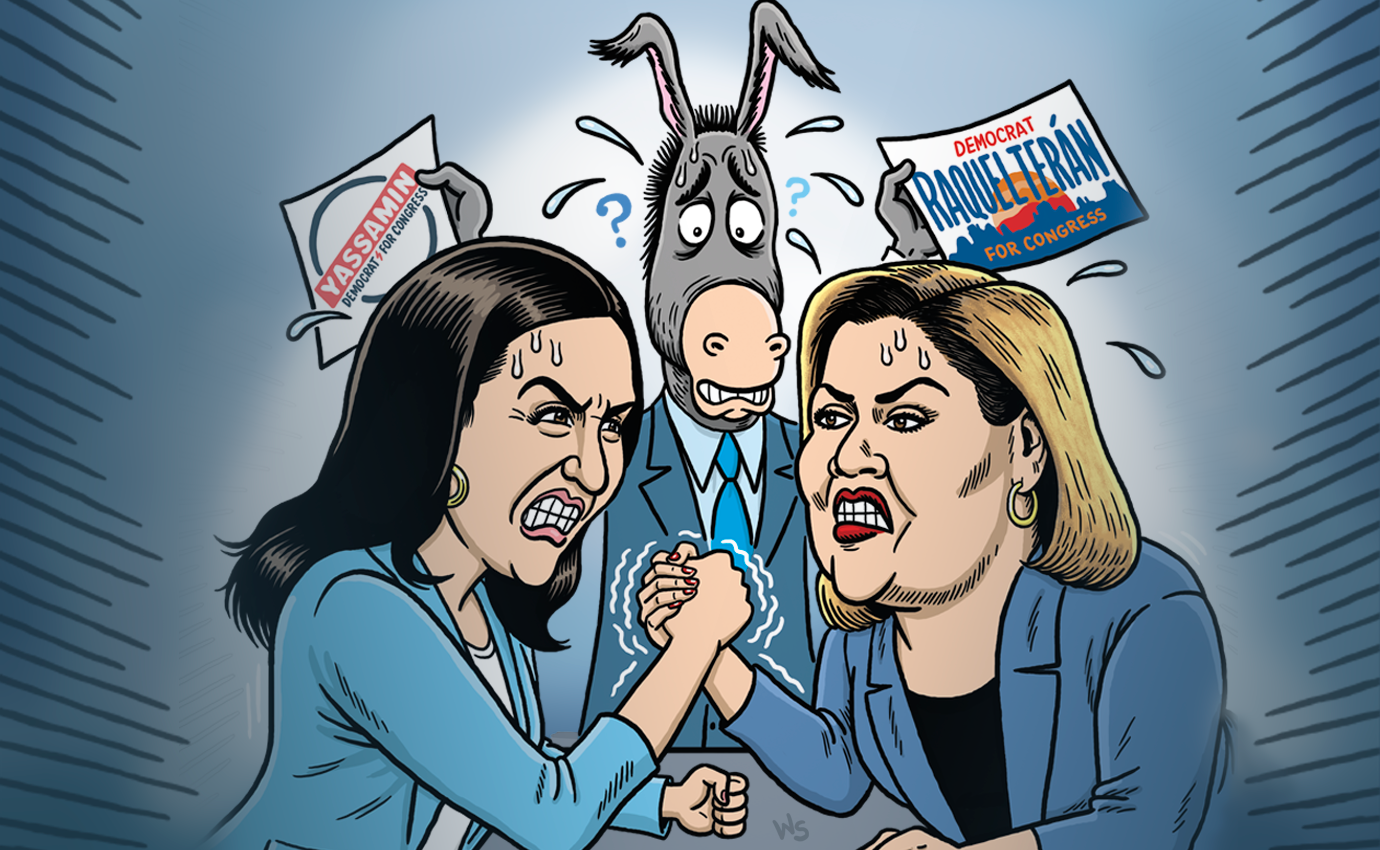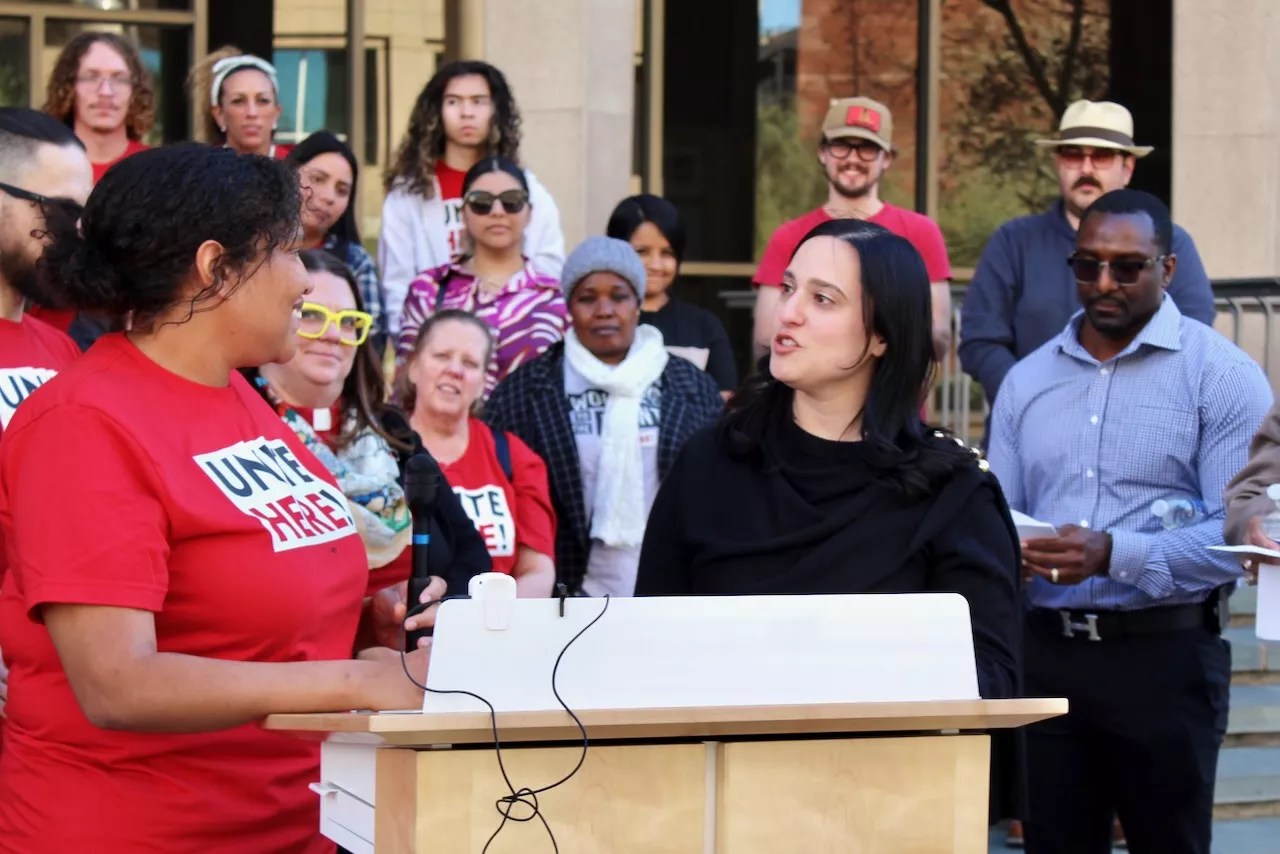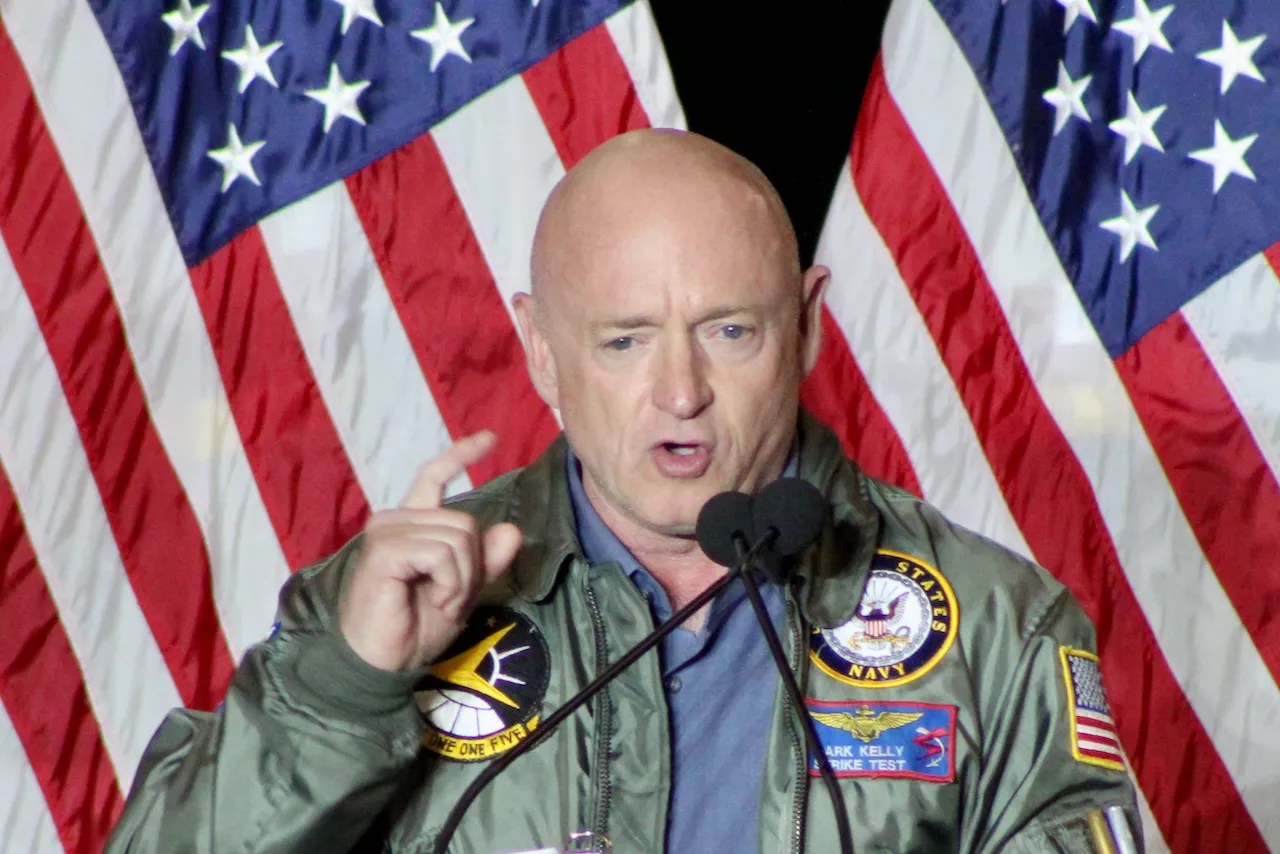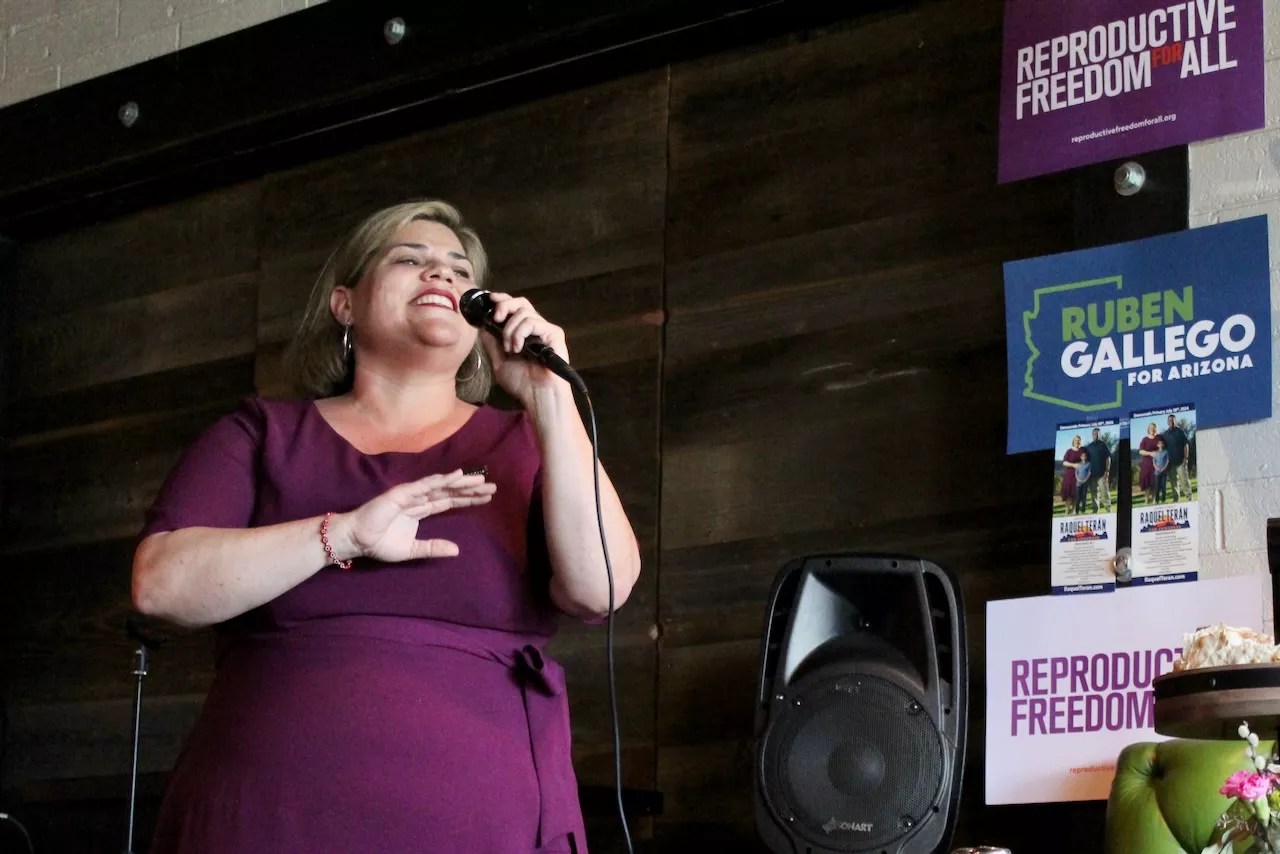
Illustration by Ward Sutton

Audio By Carbonatix
Editor’s note: This story was updated June 10 to include information from Yassamin Ansari’s financial disclosure forms and that Democratic consultant Stacy Pearson donated directly to the Ansari campaign.
Yassamin Ansari stopped making doodles with her pen and grimaced. Across the debate stage, Raquel Terán was going on the offensive.
Palms pressed down on her podium, Terán unleashed a broadside. Ansari, her Democratic primary opponent in the race to fill the U.S. House seat that Senate candidate Ruben Gallego is vacating, is a “millionaire landlord” who “has benefited from a loan from her father,” Terán inveighed. Ansari “has investment property and is charging above the average Phoenix rent,” she added.
The jab seemed to be a reference to Ansari’s financial disclosures from October 2023, which show that she owns two properties in downtown Phoenix and made between $15,000 and $50,000 last year by renting one. Ansari also estimated in the disclosure that her assets were worth between $2.5 million and $8.3 million.
Terán’s question: How could Ansari understand the economic realities of the many working class people she hopes to represent?
Minutes later, Ansari fired back. Terán resorted to a “personal attack,” Ansari said, because “she knows she cannot attack my progressive record.” As for Terán’s record, she continued, it was lackluster. Terán had “spent five years in the Arizona Legislature” but “only had one bill ever heard in committee.”
The May 22 exchange was a tense and unexpected clash between two progressive Democrats who agree on most policy issues. To that point, their campaigns had been mostly cordial with each other. But as they prepare to square off in the July 30 primary for Arizona’s 3rd Congressional District – one of the safest Democratic seats in the state, representing a wide swath of Phoenix that stretches from Maryvale to the border of Tempe – that dust-up highlighted the choice confronting voters.
Primary voters are not choosing between differing political ideologies but instead judging a battle of contrasting styles, skills and backgrounds. Terán is a political force of nature with a track record of mobilizing Democratic voters across the ticket. Ansari, on the other hand, is an even-keeled, silver-tongued young policy star who quickly rose to a top position in America’s fifth-largest city.
A third candidate is Phoenix pediatrician Duane Wooten, but he’s never held political office and is considered a long shot.
There is no clear favorite in the race. But in a heavily Democratic district – GOP primary candidates Jesus Mendoza, Jeffrey Zink and Nicholas Glenn have no chance – the primary winner is a shoo-in for the seat in November’s general election. There is no need to play to the middle to attract swing voters, allowing both Ansari and Terán to let their progressive freak flags fly.
The winner could represent the district for a decade or more, as Gallego has. That leaves voters with a dilemma: When candidates support almost all the same policies, how do you choose between them?

If elected in November, Yassamin Ansari would be the second-youngest member of Congress at 32 years old.
TJ L’Heureux
Different paths
Ansari and Terán both have forged distinguished political resumes.
Both are progressives who have focused their campaigns on socioeconomic issues such as affordable housing, stagnating wages, homelessness, the right to abortion, health care and education. Both have held top positions in Arizona politics – Ansari as vice mayor of Phoenix and Terán as the chair of the Arizona Democratic Party and, for a short time, state Senate minority leader. And both are would-be trailblazers. Terán would be the first Latina to represent Arizona in Congress, while Ansari would be the first Iranian American Democrat elected to the body.
If there are notable differences between the two women, they can be found in their background and style.
Terán, age 46, grew up in Douglas and Agua Prieta on the U.S.-Mexico border and made her name in Phoenix as a grassroots activist during the fight over Arizona’s infamous SB 1070 immigration law. After the law passed, but before it was ruled unconstitutional, Terán helped lead a successful effort to recall its sponsor, Senate Majority Leader Russell Pearce. Her name means something in the 3rd Congressional District, which has a population that, like her, is two-thirds Hispanic or Latino, according to the U.S. Census Bureau.
In 2018, Terán “traded in her megaphone for a microphone” after being elected to the Arizona House. She later was appointed to the state Senate in 2021, where she became the Democratic leader before resigning in 2023 to focus on the congressional race. She was also the chair of the Arizona Democratic Party during the 2022 election cycle, in which Democrats emerged victorious in most statewide races.
If Terán has roots in community organizing, Ansari is something of a policy wonk wunderkind. Her parents immigrated to the U.S. from Iran in 1979, and Ansari grew up in Scottsdale. While a student at Chaparral High School, she volunteered on the 2008 Obama campaign, and her resume gets only more impressive from there: Stanford for undergrad, Cambridge for a master’s, a job working on the landmark Paris Climate Agreement as a senior policy advisor to the United Nations secretary-general and a Phoenix City Council election win at age 28.
In 2023, Ansari was selected by the council to be vice mayor, and like her opponent, she also resigned in March to pursue Gallego’s seat. If elected, Ansari would be the second-youngest member of Congress at 32 years old, just in front of 34-year-old New York Rep. Alexandria Ocasio-Cortez and behind 27-year-old Florida Rep. Maxwell Frost. Unsurprisingly, Ansari’s campaign staff reflects her youth – she told New Times that almost all of her campaign workers are younger than her, as was the case for her staff at City Hall.
On the campaign trail, Ansari is wont to talk about her work at City Hall, which included leading an effort to electrify Phoenix’s bus fleet by 2040, spending money from the American Rescue Plan Act of 2021 on affordable housing units and rental assistance, legalizing casitas, raising wages and strengthening protections for city workers – though Phoenix contracts plenty of workers in its facilities.
If voters in Arizona’s 3rd Congressional District want an accomplished, progressive woman to represent them in Congress, they’ve got two to pick from.
“I think what it’s coming down to,” Democratic political consultant Stacy Pearson told New Times, “is who’s gotten what done.”
And who’s gotten whose endorsement.

While Ruben Gallego hasn’t endorsed anyone in the race, Arizona Sen. Mark Kelly has endorsed Raquel Terán.
Elias Weiss
Endorsements edge
There is at least some sense that Terán, having been a player in the state for longer than her opponent, is the favored candidate of the Democratic establishment. Her list of endorsements certainly seems to suggest as much.
According to Terán’s website, she’s been endorsed by 29 organizations and unions from across the state and country, including Planned Parenthood Action Fund, Working Families Party and several Latino organizations. That’s more than double the 13 endorsements listed on Ansari’s website, some of which are union endorsements shared by both candidates.
Terán also has nabbed endorsements from Sen. Mark Kelly, the Democrat whom Terán helped win reelection in 2022, and Rep. Raúl Grijalva, a venerated Democratic lawmaker who has represented Tucson in Congress for more than two decades.
Big endorsements – and especially Kelly’s – appear to be crucial to her campaign strategy. As of June 6, the media page of Terán’s website featured what appeared to be an internal memo. “White voters over 50,” it stated, “also need to know that Raquel is the only candidate in the race endorsed by Senator Mark Kelly.”
Kelly’s backing Terán as the heir apparent to Gallego, who has not made a formal endorsement in the race. But Pearson pointed out that a young Gallego – only three years older at the time than Ansari is now – originally was elected to the seat in 2014 as an underdog candidate against Mary Rose Wilcox, the longtime Phoenix councilmember and county supervisor.
“In 2014, the succession plan that folks had created didn’t work out either,” said Pearson, who records show donated $3,300 to the Ansari campaign in the last year. “Ruben was the disrupter.”
Ansari shouldn’t be counted out, Pearson said. She added that Ansari has the favor in Arizona’s elite business community that has “crowned kings and queens for decades” but has mostly been abandoned by the Republican Party’s shift into extremist populism.
“Those are the folks that have come to the table for Ansari,” Pearson said. “That group of moderate business leaders have had an outsized influence and a very strong track record of picking the winners.”
And it’s that support – from kingmaking moneyed donors and not regular citizens – that’s the biggest point of contention in the race.

Raquel Terán has raised only half the cash Yassamin Ansari has but has criticized Ansari’s backing from Phoenix’s business elites.
TJ L’Heureux
Donor scrutiny
Ansari’s backing from business leaders is borne out by the size of her war chest. As of March 31, the last time candidates had to submit disclosures, Ansari’s campaign had about $900,000 in cash, far outpacing Terán’s $448,000. Terán has tried to make up the difference with her rhetoric.
During their May debate and in an interview with New Times, Terán claimed Ansari was raking in money from donors who also were donating to GOP candidates, including former President Donald Trump. The Terán campaign provided New Times with a list of 16 Ansari donors who it claimed had given major contributions to Trump or other GOP candidates and political action committees. New Times reviewed data from the Federal Election Commission and records on OpenSecrets.org.
The campaign’s claims are partially true, but the list isn’t quite a grocery list of MAGA Republicans like Terán claimed during the debate. One Ansari donor is Hushang Ansary – unrelated to Ansari – who was once a member of Shah Reza Pahlavi’s inner circle in Iran before immigrating to the U.S. following the country’s revolution. In America, Ansary went on to make a fortune in oil and defraud a Dutch Caribbean insurer of $500,000, for which he was convicted in 2021. Ansary gave at least $700,000 to a Trump PAC in recent years and $6,600 directly to Ansari – the most an individual can give to one candidate under federal law – this election cycle.
While Ansary is the most colorful character on the list, the rest are more run-of-the-mill. Some donors are Romney Republicans while others are Republicans but have donated frequently to President Joe Biden during this campaign cycle. Some have Persian names, but many of these donors to the GOP appear to be members of the moderate business class Pearson said Ansari has wooed. The list even includes Doug Parker, the CEO of American Airlines.
Despite taking in less money, Terán has received nearly the same number of donations as Ansari throughout the campaign. Her top donors have been the political organizations and PACs that have thrown their support behind her.
That Terán would attack an opponent’s ties to the elite is hardly a surprise. In fact, it’s part of her appeal. While Ansari is more mild-mannered and studied, Terán casts herself as a bold fighter. Gentle policy debates would be nice, she said, but they are a luxury Arizonans can’t afford right now. Not in an era defined by extreme right-wing policies such as HCR 2060, a hard-line “border bill” that Republicans sent to the ballot on June 4.
“I want to be talking to the voters about how we can dream of having the best policy that will make their realities better,” Terán told New Times. “Unfortunately, what the Republicans do is to put these things out where we have to go on defense.”

Yassamin Ansari said her campaign workers have already knocked on 35,000 doors, while the Raquel Terán campaign declined to provide a number.
TJ L’Heureux
Knocking doors
Fighting HCR 2060, at least aside from an ongoing constitutionality challenge in the courts, is a problem for this fall. More pressing for Terán and Ansari right now is convincing primary voters to pick them.
That means recruiting volunteers and canvassing communities to speak to voters. Ansari told New Times on June 1 that her campaign workers have knocked on 35,000 doors in the district already. The Terán campaign declined to say how many doors it has knocked.
In a race so tight, between such similar candidates, a good ground game is crucial.
“One thing it will come down to,” said Pearson, “is whose volunteers are willing to go knock doors when it’s 110 degrees out.”
Summer has just started in Phoenix, and those high temperatures have already arrived. Early voting begins July 3, meaning the time is now for Ansari and Terán to present their cases. Do voters want a wonk or a fighter? The Cambridge-educated wunderkind or the seasoned grassroots activist? Would one even vote all that differently from the other?
Whoever has the most persuasive argument – or the best endorsements or most campaign cash – gets an early ticket to Congress.